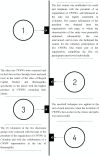Sexual health beliefs and prevention of sexually transmitted infections among cisgender women sex workers in Colombia
- PMID: 38865312
- PMCID: PMC11168633
- DOI: 10.1371/journal.pone.0305293
Sexual health beliefs and prevention of sexually transmitted infections among cisgender women sex workers in Colombia
Abstract
Introduction: The stigma and social discrimination against cisgender women sex workers lead many of them to live in conditions characterized by social inequality, marginalization, persecution, and limited opportunities for sexual health literacy. Consequently, they are often compelled to establish a framework of preventive beliefs with little scientific validity, which they use to identify, mitigate, or avoid sexual health risks arising from their interactions with clients. This study investigates the sexual health beliefs that influence self-care practices aimed at preventing sexually transmitted infections among cisgender women sex workers in Colombia.
Methods: We conducted a qualitative study framed in Hermeneutic Phenomenology. In-depth interviews and discussion groups were conducted with 34 cisgender women sex workers over 18 years of age in the center of the cities of Bogotá and Barranquilla in Colombia.
Results: Seven themes emerged from the reflective and inductive thematic analysis of the narratives: (1) popular habits for the prevention of contagion, (2) ocular assessment of genitals, (3) condom lubrication, (4) suspicion of a hidden infection in the client, (5) saliva and oral contact as a source of contagion, (6) avoidance of semen contact, (7) and trust in God as protection.
Conclusions: The findings reflect the need for health and social professionals to promote participatory and inclusive cooperation with sex workers to update the framework of preventive beliefs that help them guide sexual health self-care with autonomy and self-efficacy, strengthening favorable beliefs and negotiating unfavorable ones. It is also essential to have a sex worker-informed sexual health policy that guides the promotion of sexual health that is sensitive to the needs and consistent with the risks of sex work and ensures friendly and non-oppressive preventive care environments for sex workers.
Copyright: © 2024 Perdomo Sandoval, Goberna-Tricas. This is an open access article distributed under the terms of the Creative Commons Attribution License, which permits unrestricted use, distribution, and reproduction in any medium, provided the original author and source are credited.
Conflict of interest statement
The authors have declared that no competing interests exist.
Figures
Similar articles
-
Barriers facilitators and needs of female sex workers in Arak to access sexual health services a qualitative study.Sci Rep. 2025 Jan 18;15(1):2424. doi: 10.1038/s41598-024-84206-5. Sci Rep. 2025. PMID: 39827244 Free PMC article.
-
Use of spermicide and impact of prophylactic condom use among sex workers in Santa Fe de Bogota, Colombia.Sex Transm Dis. 1996 May-Jun;23(3):206-12. doi: 10.1097/00007435-199605000-00008. Sex Transm Dis. 1996. PMID: 8724510 Clinical Trial.
-
STD knowledge and behaviours among clients of female sex workers in Bali, Indonesia.AIDS Care. 1994;6(4):459-75. doi: 10.1080/09540129408258661. AIDS Care. 1994. PMID: 7833364
-
Barriers to Accessing Sexual Health Services for Transgender and Male Sex Workers: A Systematic Qualitative Meta-summary.AIDS Behav. 2020 Mar;24(3):682-696. doi: 10.1007/s10461-019-02453-4. AIDS Behav. 2020. PMID: 30868447
-
[Current status of the female condom in Africa].Sante. 1997 Nov-Dec;7(6):405-15. Sante. 1997. PMID: 9503499 Review. French.
References
-
- Alizade M, Farshbaf-Khalili A, Malakouti J, Mirghafourvand M. Predictors of preventive behaviors of AIDS/HIV based on Health Belief Model constructs in women with high-risk sexual behaviors: A cross-sectional survey. J Educ Health Promot. 2021; 10:446. doi: 10.4103/jehp.jehp_1046_20 - DOI - PMC - PubMed
-
- Platt L, Grenfell P, Meiksin R, Elmes J, Sherman SG, Sanders T, et al.. Associations between sex work laws and sex workers’ health: A systematic review and meta-analysis of quantitative and qualitative studies. Tsai AC, editor. PLoS Med. 2018;15(12): e1002680. doi: 10.1371/journal.pmed.1002680 - DOI - PMC - PubMed




